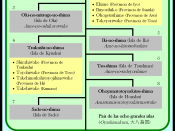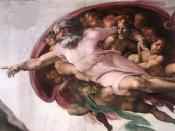Name Here
Instructor Name
1 |
4 |
Myths have been a great part of history, from the very moment humans roamed the green marble we call Earth. Therefore, mythology has become just as relevant in attempting to answer life's greatest questions as any scientific method. Myths have shaped our world from the very beginning to the world we live in today. We will explore the common meaning of myth versus the academic meaning of myth, what are some of the common mythological themes, and the relationship between belief, knowledge, mythology, and religion.
Myth is a word commonly used to describe "a widely held but false belief or idea," (Google, 2014). As an example, when someone says 'that's a myth,' they are commonly referring to something being false, untrue, or nonfactual.
It is in this context that the majority of the population would use and have used the word myth. In an academic context, a myth is an ancient narrative that attempts "to answer the enduring and fundamental human questions," (Leonard & McClure, 2004, pg. 1). I would define a myth as a statement or event that is believed in without factual basis. Just because the facts elude us, does not make something untrue or false, merely unproven. If something remains unproven, it should not be considered or perceived as false. After all, if it is not proven to be false, it does not make it true and vice versa.
The most common mythological themes are of creation, the birth of order, and secretion themes. Many diverse culture around the globe address such similar and universal themes because they are all attempting to answer the most profound questions. Questions that...


